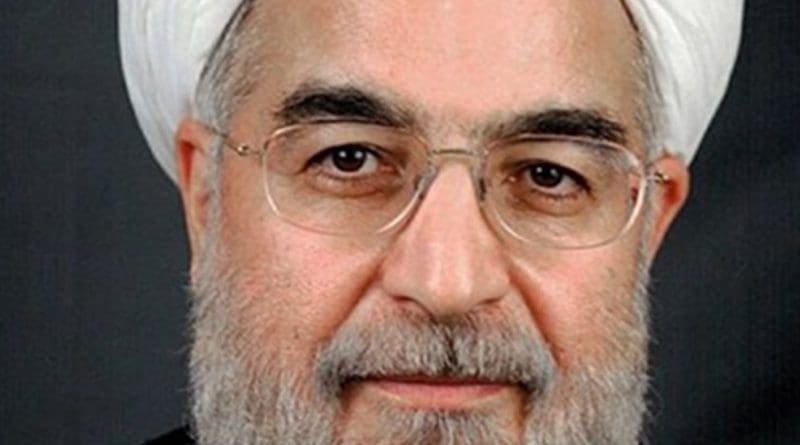Rohani Shines At The UN – OpEd
Warmly greeted as the hero of Iran nuclear agreement that has (hopefully) resolved one of the most vexing international issues, Iran’s President delivered a powerful and dignified speech before the General Assembly on Monday that resonated with the current mood in the international community in favor of civil and diplomatic resolution of disputes instead of resorting to violence and war.
Unfortunately, Rohani had to cut his trip short and return to Iran for the ceremony retrieving the bodies of Iranian pilgrims killed in the Hajj stampede, which he forcefully blamed in his UN speech on Saudi mismanagement and incompetence. A day before, at a private session with a group of American pundits, Rohani expressed his regret that contrary to his wishes, the relations with Saudi Arabia had deteriorated since the takeover of new leadership in Riyadh. The Saudis’ refusal to either apologize or issue a statement of regret over the death of so many pilgrims under their control has angered Iranians and effectively ended Rohani’s two-year overtures. Adding salt to injury, the Saudi foreign minister has reportedly declined to meet with Iran’s foreign minister Javad Zarif, who has demanded an inquiry into the deaths of some 220 Iranian pilgrims alone.
In his speech, Rohani defended the nuclear agreement as a victory for global diplomacy and reiterated Iran’s commitment to uphold its obligations, while urging the other side to do the same. The lifting of sanctions on Iran is a top priority and there are still unresolved questions that have been raised at the Iran and “5 +1” nations discussions on the sideline of UN summit. According to members of the Iranian negotiation team who spoke with the author, another issue is the redesigning of heavy water reactor in Arak.
Concerning the latter, according to the nuclear agreement, known as the Joint Comprehensive Plan of Action (JCPOA), the reactor’s core needs to be removed and replaced with a new one that produces considerably less amount of plutonium. This is a technically challenging process and might take time. Per the JCPOA, an international advisory group would finalize the new design, but that has not happened yet and, in turn, this presents a complicating factor because if Iran moves ahead with its commitment to remove the core and yet the West procrastinates on the new core, then Iran will be indefinitely deprived of a heavy water reactor that produces radio isotopes for various medical and other purposes. In that case, Arak would become a certificate of Western betrayal and bad faith negotiations, and politically taxing on the moderate Rohani government. It is therefore incumbent on the Iranian team to make sure that the Arak core is not touched until there is full-proof agreement on a re-designed core, otherwise prospects of a major vulnerability for Iran looms.
With the JCPOA altering the international climate in Iran’s favor, Iran’s President’s UN trip was also aimed at shoring up support for Iran’s regional and international policies, which is why he focused on the need for coordinated action against terrorism and extremism. Iran, Russia, and Iraq have now entered a new intelligence-sharing agreement with respect to the ISIS terrorists, and this has clearly irritated Washington, that prefers to keep Moscow at a distance and play leadership role in Middle Eastern affairs. This might explain the rather harsh tone of President Obama’s speech, the fact that he accused Iran of fomenting instability in the region and, yet at the same time, left the door a jar open on US’s cooperation in the fight against ISIS.
Russia’s President Putin in his speech called for a WWII-style alliance against ISIS, which ought to appeal to some US policy-makers who recognize the importance of defeating ISIS through collective efforts. Presently, the US’s anti-ISIS policy is mired in incoherence, given the negative influence of Saudi Arabia and other conservative Sunni states who finance and support the radical Jihadists fighting Shiites headed by Iran in the region, including in Syria.
With respect to Syria, Rohani has emphasized the need to single prioritize on the fight against terrorism, arguing forcefully that fighting terrorism and the government of Syria at the same time is a recipe for disaster. He recognizes the need to reform the Syrian government but insists that a sequence of actions beginning with the defeat of foreign fighters and then the return of refugees prior to political changes is necessary. Iran and Russia and a number of other countries are working together to draft a new Syria action plan that will likely fall on deaf ears in US if Washington continues with its present hostilities toward the government of Bashar al-Assad.
But, Iran is hopeful that the US will turn around and adjust its Syria policy simply because the present US policy is bound to have long-term disastrous results by paving the road for ISIS’s takeover. Some of US’s Western allies such as France have come to this point, which is why the Iranian and French presidents had a constructive meeting at UN and recognized their “meeting points” on Syria.
“We are discussing Syria with the Americans through the Europeans,” an Iranian diplomat confided, adding that they are not authorized to discuss non-nuclear issues with the US. In his trip, Rohani also met a number of other European officials including the British Prime Minister David Cameron, who stated his government’s commitment to the terms of the nuclear agreement. London is on a new cordial path with Iran and about to dispatch a huge trade delegation to Iran, a visible sign of growing normalization of Iran-West relations in the post-JCPOA environment.

